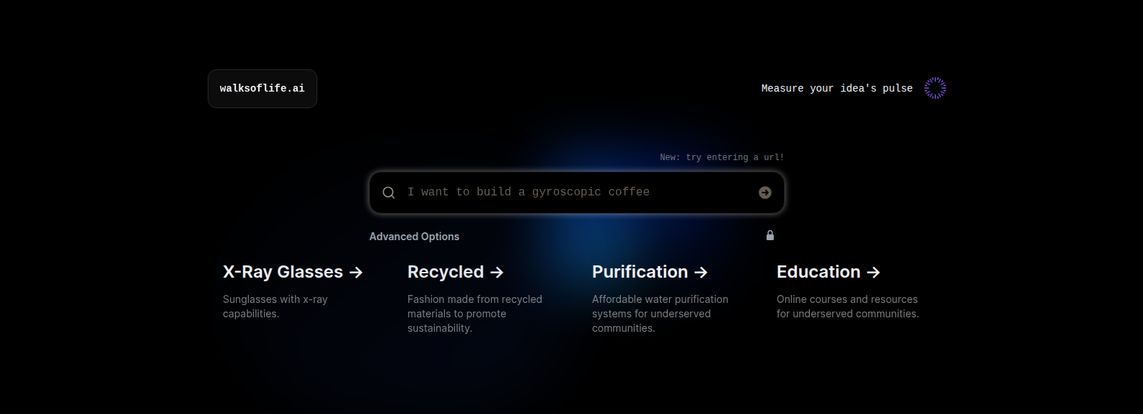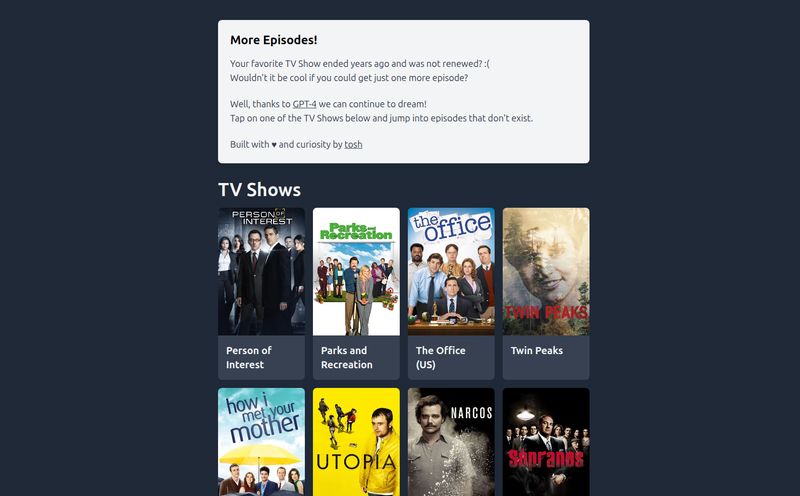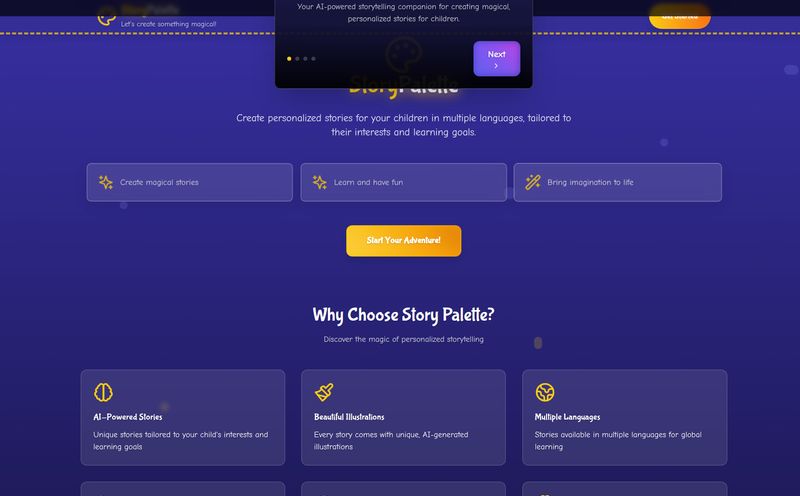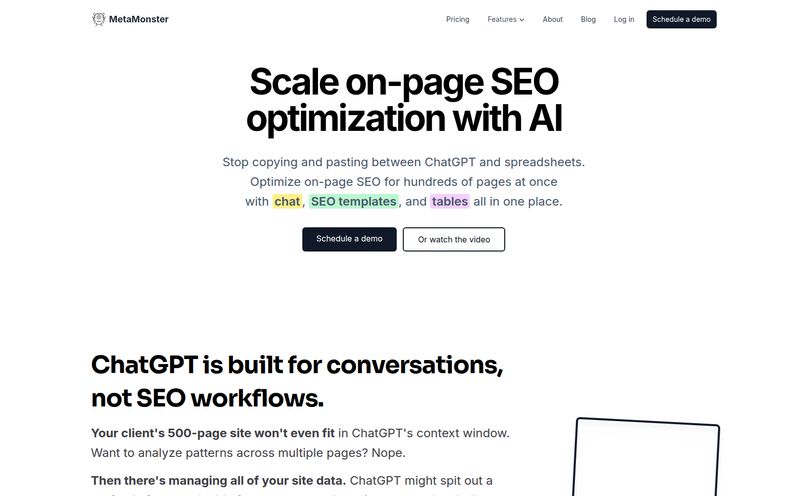I have a graveyard of ideas. Seriously. It’s a digital boneyard filled with half-baked SaaS concepts, world-changing app mockups, and content strategies that were definitely going to go viral. You probably have one too. Every entrepreneur, marketer, and creator does. The biggest ghost haunting that graveyard is the question: “What if?” What if I had just known, right from the start, if the idea had legs?
The traditional answer is market research. Focus groups. Surveys. Pouring weeks of time and a budget that could buy a decent used car into getting feedback. It’s a slog. A necessary one, sure, but a slog nonetheless. And for bootstrapped founders or small teams, it's often a complete non-starter. So we do what we always do: we build it, we cross our fingers, and we hope for the best. Sometimes it works. Often, it doesn't.
But what if you could get a gut check before you wrote a single line of code or spent a dollar on a domain? I recently stumbled across a tool called Walks of Life AI that claims to do just that. It promises an AI-powered focus group on demand. Naturally, my inner SEO-and-trends geek perked up. An AI to test ideas? I had to see this for myself.
So, What Is This Walks of Life AI Thing Anyway?
At its core, Walks of Life AI is an idea validation platform. But instead of polling real people, it simulates feedback from hundreds of different AI “personas.” Think of it like a flight simulator for your product launch. You get to see how your idea might crash and burn—or soar—without any real-world consequences.
The concept is simple and frankly, pretty compelling. You pop in your idea, whether it’s a new business, a product feature, or even just a URL to an existing landing page. The platform then runs it through a gauntlet of AI-generated people from all, well, walks of life. You can create mini focus groups, run what they call alpha tests, and even have a direct chat with the personas who either love or absolutely despise your concept. It’s like having a digital town hall for your nascent idea, filled with critics and fans you never knew you had.

Visit Walks of Life AI
Kicking the Tires: My First Test Drive
The homepage is slick. Dark mode, minimalist, with a big inviting prompt: “I want to build a…” followed by some quirky examples. My favorite was “gyroscopic coffee.” I mean, who doesn't want that? It immediately sets a tone of creative exploration.
To give it a fair shake, I decided to test a concept that’s been bouncing around in my head: “A premium subscription box for high-fashion clothing made entirely from recycled ocean plastics.” It hits all the modern buzzwords: sustainable, subscription, fashion. It could be huge, or it could be a massive flop.
So, I typed it in. What I imagine happening next (and what the platform promises) is the magic. I’m not just getting a simple “yes” or “no.” I’m getting simulated feedback. I can practically hear the personas now:
- Chloe, the 22-year-old fashion student: “OMG, I love the sustainability angle! But is it actually stylish? Like, I don’t want to look like I’m wearing a fishing net. Can I see a lookbook? Is it on TikTok?”
- Dave, the 45-year-old frugal accountant: “How much is ‘premium’? And how do I know it’s really from ocean plastic? Sounds expensive and I can get a perfectly good shirt at the mall. What’s the ROI on my wardrobe?”
- Maria, the 35-year-old eco-conscious mom: “This is a wonderful idea. My main concern is durability and if the clothes are safe for my skin. Are there microplastics? I'd pay more for something that’s truly ethical and safe for my family.”
This is the potential power here. It’s not just data; it’s perspective. It forces you to think about questions you hadn't even considered.
The Real Advantages of an AI Crystal Ball
After playing around, a few clear benefits started to emerge. First and foremost is speed. An idea that would take me weeks to research with traditional methods gets an initial reaction in minutes. This speed allows for rapid iteration. You can tweak your idea based on the AI feedback, run it again, and refine it in a single afternoon. That’s a powerful loop for any creator.
Then there's the cost-effectiveness. Let's be blunt: real focus groups are expensive. You're talking venue hire, recruitment, incentives, and a moderator's time. It can easily run into thousands, or even tens of thousands, of dollars. For a startup founder sketching ideas on a napkin, that's an impossible hurdle. An AI tool dramatically lowers that barrier to entry for getting directional feedback.
Finally, it helps you break out of your own echo chamber. We all have biases. We ask our friends and family for feedback, and they're either too nice to tell us the truth or they think just like we do. Getting feedback from an AI persona designed to be a “cynical teenager” or a “tech-skeptical senior” can provide a much-needed, if sometimes brutal, dose of reality. It’s an early warning system for a flawed concept, and catching those flaws early is priceless.
Let's Be Real: The Potential Problems and Pitfalls
Okay, I’m an optimist, but I’m also a realist. As exciting as this is, there are some pretty obvious counterarguments. The biggest one is the lack of a true human element. Can a large language model, no matter how well-trained, truly capture the beautiful, messy, and often irrational nuance of human reaction? Gut feelings, cultural sarcasm, shared memories—these are things that shape our opinions in ways algorithms might miss. I’m skeptical that an AI can replicate the spark of a real conversation where one person’s off-hand comment triggers a genius idea in someone else.
The whole system also hinges on the quality of its AI personas. If the personas are just shallow stereotypes, then you’re getting feedback based on a caricature, not a customer archetype. Garbage in, garbage out. The effectiveness of Walks of Life AI is directly tied to how deep and well-constructed these digital personalities are. I’d love to know more about the data and methodology behind their creation.
And on a smaller, more practical note, it seems to be desktop-only for now. Its a bit of a bummer in a world where I'm constantly trying to do things from my phone, but probably not a dealbreaker for a deep work session on a new idea.
So, Who Is This Tool Actually For?
I see a few key groups getting a lot out of this.
First, the scrappy startup founders and indie hackers. People who live and breathe the lean startup methodology. This is the ultimate tool for the “fail fast” mantra. Test ten ideas before lunch, find the one with the most promise, and focus your limited resources there.
Next are product managers and marketers inside larger companies. Need a quick sanity check on a new feature before you pitch it to your boss? Want to test a few different angles for an ad campaign before you blow your CPC budget? This could be a fantastic, low-stakes way to gather preliminary data and build a stronger internal case.
Even content creators like me can find value. Thinking of launching a new course or a newsletter? Run the concept through the AI. See what questions and objections a “busy professional” persona might have, and then address those directly in your marketing copy.
What's the Damage? A Look at the Pricing
Here's the million-dollar question. As of this writing, I couldn't find a public pricing page for Walks of Life AI. The website keeps it under wraps. This usually means one of a few things: the product is still in a private beta, they're operating on a freemium or free trial model to attract early users, or they have an enterprise-focused sales model where you have to request a demo.
My gut tells me it's likely in an early stage, gathering feedback on the tool itself. I'd recommend heading over to their site and signing up. There might be a free tier to play around with, which would be the best way to see if it’s a fit for you.
My Final Verdict: Is Walks of Life AI a Gimmick or a Game-Changer?
So, what’s the final word? I don’t think Walks of Life AI is a replacement for talking to real, breathing customers. It never should be. The deep insights you get from a face-to-face conversation are irreplaceable.
However, I absolutely see it as a powerful new step in the idea generation process. Think of it as a spell-checker for your business plan. It won't write the next great novel for you, but it will absolutely catch the glaring typos and awkward sentences before you embarrass yourself by sending it to a publisher. It's a filter. A way to weed out the non-starters and refine the promising concepts so that when you do invest in real-world feedback, you’re starting from a much stronger position.
In a world where speed is a competitive advantage, a tool that lets you test, iterate, and validate at the speed of thought is more than just a novelty. It's a genuine weapon. Go give it a spin with your wildest, most unhinged idea. The worst thing that can happen is an AI tells you it's terrible—and believe me, that’s a lot less painful than the market telling you the same thing six months and fifty grand later.
Frequently Asked Questions
What is Walks of Life AI in simple terms?
Walks of Life AI is an online tool that acts like a super-fast, simulated focus group. You input your business or product idea, and it gives you feedback from a variety of AI-generated personas, helping you see potential strengths and weaknesses before you build anything.
How is this different from a real focus group?
The main differences are speed, cost, and depth. Walks of Life AI is almost instantaneous and far cheaper than a traditional focus group. However, it can't fully replicate the nuanced, unpredictable, and deep conversational insights you might get from interacting with real humans.
Is Walks of Life AI free to use?
As of late 2023, the pricing information is not publicly available on their website. It might be in a free beta phase or require you to sign up to see pricing tiers. It's best to check their official site for the most current information.
Can I test an existing website or product?
Yes. The platform includes a feature that allows you to enter a URL. This lets you get AI persona feedback on an existing landing page, product site, or online portfolio, which is great for refining your messaging or user experience.
How accurate is the AI feedback?
This is the critical question. The accuracy depends entirely on the sophistication of the AI personas. It should be treated as a directional guide, not absolute truth. It's excellent for spotting big-picture issues and generating questions, but it's not a substitute for real-world user data.
Who is the ideal user for this tool?
It's ideal for startup founders, indie developers, product managers, and marketers who need to validate and iterate on ideas quickly and affordably, especially in the very early stages of a project.
Reference and Sources
For the most up-to-date information or to try the tool for yourself, visit the official website:



